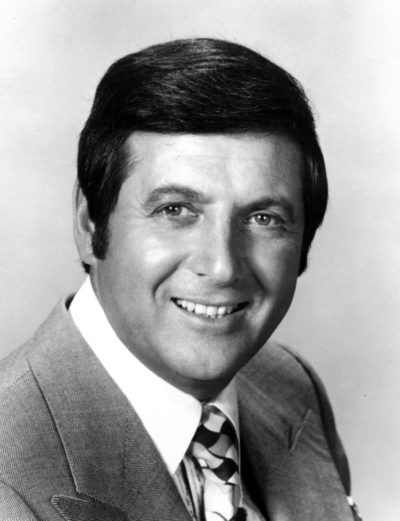Monty Hall (Monte Halparin)

Monty Hall started his career in Winnipeg at CKRC radio while still a student. He moved to Toronto in 1946 and found a job with radio station CHUM, where management shortened his name to Hall and misspelled his first name as “Monty” on billboards, giving him the stage name “Monty Hall”. For the next decade he hosted and produced a number of programs for radio stations in Toronto as well as Who Am I? on CFRB, which was distributed nationally in Canada through private syndication until 1959. He also had several short-lived programmes on CBC Television, after it was launched in 1952, but when they were cancelled and another program he had conceived of was taken away from him, Hall decided he had no future in Canadian television. Monty Hall moved to New York City in 1955 to try to break into American broadcasting, but commuted to Toronto several times a month to record episode blocks of Who Am I?. In New York, Hall hosted game shows such as Bingo at Home on WABD-TV and guest-hosted more established game shows such as Strike It Rich on CBS and Twenty-One on NBC. He was the host/performer of two local New York City TV film shows for children: Cowboy Theater for WRCA (Channel 4) in 1956 and Fun In the Morning for WNEW (Ch. 5) in the early 1960s. From 1956–60, along with NBC Radio newsman Morgan Beatty, Hall co-hosted the Saturday night segment of the NBC Radio Network weekend program Monitor from 8 p.m. until midnight (EST). At least two recordings of Hall on Monitor are known to exist. Hall was a radio analyst for the New York Rangers of the National Hockey League during the 1959–60 season.
He succeeded Jack Narz as host of a game show called Video Village, which ran from 1960 to 1962 on CBS. From 1961-62, Hall hosted its spinoff, Video Village Junior, which featured children. After moving to Southern California, Hall became the host of the game show Let’s Make a Deal, which he developed and produced with partner Stefan Hatos. Let’s Make a Deal aired on NBC daytime from December 30, 1963, to December 27, 1968, and on ABC daytime from December 30, 1968 until July 9, 1976, along with two prime time runs. It aired in syndication from 1971–77, from 1980–81, from 1984–86, and again on NBC briefly from 1990–91, replacing Bob Hilton, who had been dismissed. He was producer or executive producer of the show through most of its runs. During the show’s initial run, Hall appeared alongside model Carol Merrill and announcer Jay Stewart. Besides Let’s Make a Deal, the game show Split Second, which originally ran on ABC from 1972-75 with Tom Kennedy as host, and again in syndication in 1987 with Hall hosting that version, was the only other successful program from Hatos-Hall Productions. Other game shows from Hatos’s and Hall’s production company included Chain Letter in 1966; a revival of the venerable 1950s-era panel quiz, Masquerade Party in 1974; 3 for the Money in 1975; It’s Anybody’s Guess in 1977, which reunited Let’s Make a Deal announcer Jay Stewart with Hall, who also hosted the show, and the Canadian-based The Joke’s on Us in 1983. Monty Hall filled in as guest host on several daytime game shows while Let’s Make a Deal was on NBC, most notably What’s This Song? and PDQ.
In 1979, Monty Hall hosted the only game show since Video Village which he did not produce, Goodson-Todman’s All-New Beat the Clock. He appeared as himself on “The Promise Ring” episode of That ’70s Show in 2001. He played the host of a beauty pageant who schemed to become “the world’s most powerful game show host” in the Disney animated series American Dragon: Jake Long. He appeared on GSN Live on March 14, 2008, and hosted a game of Let’s Make a Deal for Good Morning America on August 18, 2008, as part of Game Show Reunion week. In summer 2009, CBS announced that it was reviving Let’s Make a Deal on its daytime schedule. The show premiered on October 5, 2009, with Wayne Brady as host. Hall is credited as “Creative Consultant,” and as co-creator of the format (with Stefan Hatos) with Hatos/Hall Productions being credited as co-production company (with FremantleMedia). On September 30, 2017, Hall died from heart failure at his home in Beverly Hills at the age of 96.
Born
- August, 25, 1921
- Canada
- Winnipeg, Manitoba
Died
- September, 30, 2017
- USA
- Beverly Hills, California
Cause of Death
- heart failure



